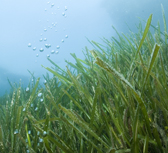Environment: marine organisms adapting to climate change in the Mediterranean Sea
9/6/2015
An experimental study conducted at ENEA and published in “The Royal Society Open Science” journal, reveals that some marine organisms are adapting to changing seawater conditions in order to survive to the projected acidification of the Mediterranean sea as an effect of climate change.
Some marine organisms that live fixed to the sea bottom and can’t avoid the adverse effects of sea water acidification, have found a way to change their skeleton morphology, adapting to the lower seawater pH that causes their skeletons to erode and dissolve.
 These are the conclusions of an experimental study conducted by Chiara Lombardi and Silvia Cocito, biologists at the ENEA S. Teresa Marine Environment Research Center, in collaboration with the Naples Zoological Station and the London Natural History Museum.
These are the conclusions of an experimental study conducted by Chiara Lombardi and Silvia Cocito, biologists at the ENEA S. Teresa Marine Environment Research Center, in collaboration with the Naples Zoological Station and the London Natural History Museum.
The study, titled “Morphological plasticity in a calcifying modular organism: evidence from an in-situ transplant experiment in a natural CO2 vent system”, was published in one of the world’s top-ranked journals, The Royal Society Open Science, that dedicated its cover to the image of the Briozoo Calpensia Nobilis on which the experimental study was conducted.
The experimental study was carried out in the volcanic area of the Aragonese castle in the island of Ischia, where the acidification levels expected by the year 2100 occur spontaneously, and where marine invertebrates, model organisms with carbonic skeletons, were transplanted.
“The studies to further understand how marine organisms are responding to climate change are pivotal to predicting their chances of survival and their capacity to adapt to a changing Mediterranean Sea.
In fact - Silvia Cocito, ENEA researcher, explains - the capacity of an organism to adapt to climate change over the long term, through colonization and long-term permanence in an altered environment, could greatly affect natural selection and evolution”.
The unabridged article can be accessed at:
http://rsos.royalsocietypublishing.org/content/2/2140413
For more information please contact:
Silvia Cocito, ENEA S. Teresa Marine Environment Research Center silvia.cocito@enea.it
Chiara Lombardi, ENEA S. Teresa Marine Environment Research Center Chiara.lombardi@enea.it
